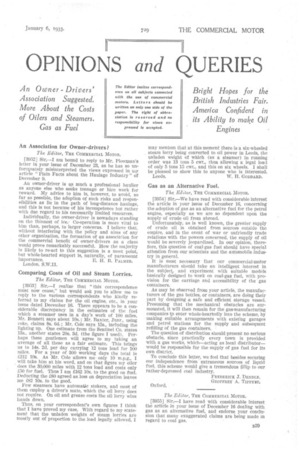Gas as an Alternative Fuel.
Page 43

If you've noticed an error in this article please click here to report it so we can fix it.
The. Editor, THE COMMEROLAL MOTOR.
[3934] Sir,—We have read with considerable interest the article in your issue of December 16, concerning the adoption a gas as an alternative fuel for the petrol engine, especially as we are so dependent upon the supply of crude oil from abroad.
Unfortunately, as is well known, the greater supply of crude oil is obtained from sources outside the empire, and in the event of war or unfriendly trade relations with the powers concerned, the supply of oil would be severely jeopardized. In our opinion, therefore, this question of coal-gas fuel should have special attention from our scientists and the automobile industry in general. It is most necessary that our commercial-motor manufacturers should take •an intelligent interest in the subject, and experiment with suitable models basically designed to work on coal-gas fuel, with provision for the carriage and accessibility of the gas containers.
As may be Observed from your article, the manufacturers of the gas bottles, or containers, are doing their part by designing a safe and efficient storage vessel. Presuming that the mechanical obstacles are surmounted, it will then remain for the gas-manufacturing companies to enter whole-heartedly into the scheme, by making suitable arrangements with existing garages and petrol stations for the supply and subsequent refilling of the gas containers.
The question of distribution should present no serious obstacle, since practically every town is provided with a gas works, which—acting as local distributor— would be responsible for the supply of gas fuel for its own district.
To conclude this letter, we feel that besides securing our independence from ' extraneous sources of liquid fuel, this scheme would give a tremendous fillip to our rather-depressed coal industry.
FREDERICK J. DENDLE. GEOFFREY A. TIPPEIT. Oxford.




























































































